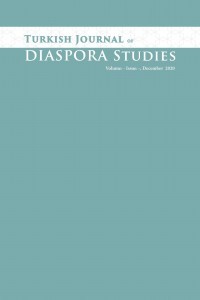The Turkish-German Bridge: A Unique Socio-Spatial Construction in Kreuzberg
The Turkish-German Bridge: A Unique Socio-Spatial Construction in Kreuzberg
Urban Sociology, Social Construction of Space, Migration, Thirdspace hybridity,
___
- Aktürk, Ş. (2011). Regimes of Ethnicity: Comparative Analysis of Germany, the Soviet Union/Post-Soviet Russia, and Turkey. World Politics, 63(1), 115-164.
- Atasü Topçuoğlu, R. and Akbaş, E. (2011). An Attempt to See the Soul of the Change: Kreuzberg from Margins into the Center. Sosyoekonomi Society, Issue 2011.
- Aydıngün, A. (2002). Creating, recreating and redefining ethnic identity: Ahiska/Meskhetian Turks in Soviet and post-Soviet contexts. Central Asian Survey, 12(2), 185-197.
- Barth, F. (1969). Ethnic groups and Boundaries: the Social Organization of Culture Difference. Boston: Little, Brown.
- Faist, T. 1998. “Transnational Social Spaces out of International Migration: Evolution, Significance and Future Prospects.” Archives Europeennes De Sociologie/European Journal of Sociology/Europaeisches Archiv für Soziologie, 39(2), 213-246.
- Giddens, A. (1984). The Constitution of Society. Cambridge: Parity.
- Güney, S., Kabaş, B. and Pekman. C. (2017). The Existential Struggle of Second-Generation Turkish Immigrants in Kreuzberg: Answering Spatiotemporal Change. Space and Culture, 20(1), 42-55.
- Hinze, A. M. (2013). Turkish Berlin: Integration Policy & Urban Space. Minneapolis and London: University of Minnesota Press.
- Hochmuth, H. (2017). The return of Berlin-Kreuzberg. Brought back from the margins by memory. Journal of Contemporary European Studies, 25(4), 470-480.
- Howard, M. M. (2012). Germany’s Citizenship Policy in Comparative Perspective. German Politics & Society, 30(1), 39-51.
- Jenkins, R. (1996). Social Identity. London and New York: Routledge.
- Lefebvre, H. (1991). The Production of Space. Oxford: Blackwell.
- Lefebvre, H. (2014). Critique of Everyday Life, the One-Volume Edition. London: Verso.
- Ludewig, A. (2017). Documenting self-loathing or ‘We are proud of not being proud:’ Neukölln Unlimited and Prinzessinnenbad as examples of failed integration. Journal of European Studies, 47(3), 275–289.
- Mayer, M. (2013). New Lines of Division in the New Berlin. In M. Bernt, B. Grell, and A. Holm (Eds.), The Berlin Reader (pp. 95-106). Bielefeld: transcript Verlag.
- Molotch, H., Freudenburg, W., and Paulsen, K. (2000). History Repeats Itself, But How? City Character, Urban Tradition, and the Accomplishment of Place. American Sociological Review, 65(6), 791–823.
- Özyürek, E. (2009). ‘The Light of the Alevi Fire Was Lit in Germany and then Spread to Turkey:’ A Transnational Debate on the Boundaries of Islam. Turkish Studies, 10(2), 233-253.
- Rittersberger-Tılıç, H. (1998). “Development and Reformulation of a Returnee Identity as Alevi.” In: T. Olsson, E. Özdalga, and C. Raudvere (Eds.), Alevi Identity (pp. 69-78). Istanbul: Swedish Research Institute in Istanbul.
- Stehle, M. (2006). Narrating the Ghetto, Narrating Europe: From Berlin, Kreuzberg to the Banlieues of Paris. Westminster Papers in Communication and Culture, 3(3), 48-70.
- Sökefeld, M. (2008). Struggling for Recognition: the Alevi Movement in Germany and in Transnational Space. New York: Berghahn Books.
- Tsing, A. (2004). Friction: An Ethnography of Global Connection. Princeton: Princeton University Press.
- ISSN: 2717-7408
- Yayın Aralığı: Yılda 2 Sayı
- Başlangıç: 2021
- Yayıncı: Göç Araştırmaları Vakfı
The Relationship Between the Police and Third Generation Turkish Immigrants in Germany
Essays on Secularism and Multiculturalism
The Turkish-German Bridge: A Unique Socio-Spatial Construction in Kreuzberg
The German Government’s Policy on Islam and Its Reflections on Turks in Germany
Yaşar AYDIN, Buket ÖKTEN SİPAHİOĞLU
Limits of Citizenship Migrants and Postnational Membership in Europe
